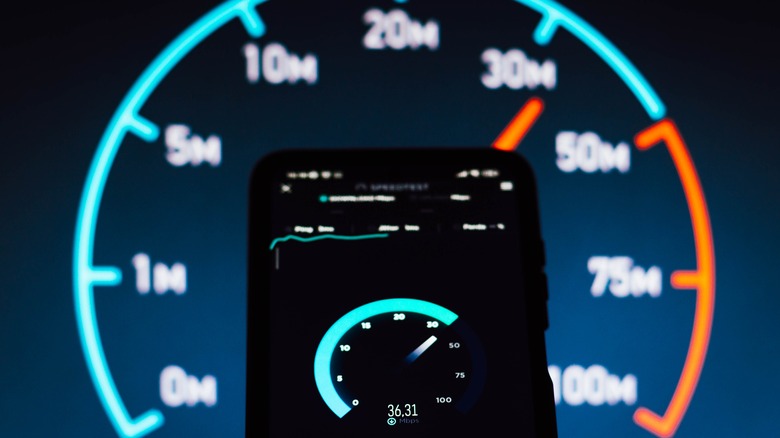What 'Mbps' Means And How It Impacts Your Internet Connection
It's likely that you've encountered a string of letters known as "Mbps" a few times in life — either while looking into home or work internet options, or simply perusing the internet in general. But what does the abbreviation actually mean?
"Mbps" is the current standard for measuring internet speeds, which you can do yourself if you're curious about how your own home or work connection stacks up. Back in the ancient days of dial-up modems we would clock our internet in kilobits, hence the prevalence of 14.4k, 28.8k, and 56.6k modems. But eventually broadband internet became the norm, replacing kilobyte measurements with megabits.
This is where "Mbps" comes in, as shorthand for "Megabits-per-second." One megabit is roughly equivalent to 1,000 kilobits (precisely 1,024), so measurements in "Mbps" are approximately larger than "Kbps" by a factor of one thousand. This shift in terminology pulls double-duty by acting as a fairly universal system of measurement, and keeping the numerical values a bit more digestible. Because it would be kind of awkward to say someone's internet was 75,000 Mbps or 75k Mbps, you know?
Why Mbps matters
The importance of Mbps — specifically your internet's Mbps — comes down to download and upload speeds. Though it's not exactly a 1-to-1 with something like mph (miles per hour), because internet speeds are shared across devices. If multiple people or devices are connected to and using the same internet connection simultaneously, you'll start to see a dip in speeds as the connection has to be divided up among them all.
Technically there's no "too fast" when it comes to your internet speeds, however cost and availability are always a factor. Depending on your area and available service providers, you may not be able to utilize a 500+ Mbps connection, or the fastest speeds may be too expensive. But that doesn't necessarily mean your internet is lacking, either.
It all comes down to what you use your internet for, as different activities carry different optimal speeds. Uploading can get by on lower speeds if you typically don't send large files online, while downloading usually benefits from higher speeds so that saving files to your devices or streaming high quality video is smoother and faster.
A decent average download speed for the typical household is between 25 Mbps and 100 Mbps, as it can support common activities like browsing, social media, and video streaming across multiple connected devices. Though you may want to double-check your speeds from time to time as some providers may occasionally throttle (i.e. slow down) users' internet for one reason or another.

